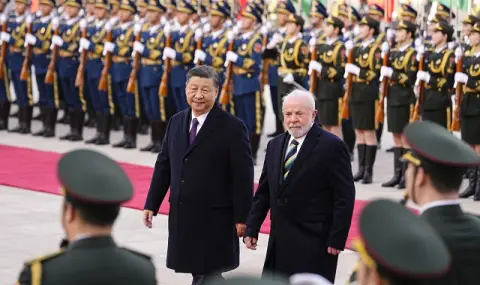Chinese President Xi Jinping will meet his Brazilian counterpart Luiz Inacio Lula da Silva today in Brazil. On this occasion, AFP lists five things to know about China-Brazil relations:
„Pragmatic relations“
China and Brazil are respectively the second and seventh most populous countries in the world and are becoming increasingly important players on the international stage.
Their geopolitical rapprochement became more apparent after returning to power in January 2023. of Brazil's leftist president Lula da Silva.
“It is normal for the Chinese Communist Party (CCP) to feel more comfortable talking to left-wing governments,” Marcos Caramuru, Brazil's former ambassador to Beijing, told AFP, although he said relations were “completely pragmatic” .
The two countries are key participants in BRICS, of which they are the founders, and are working to ensure that the bloc plays a leading role in the world.
According to Jorge Heine, Chile's former ambassador to China and researcher at Boston University, “the more tensions grow in its relations with the US and Europe, the more Beijing focuses on the Global South, where Brazil plays a leading role”.< /p>
As for the conflict in Ukraine, both sides have tried to mediate between Kyiv and Moscow, but so far without success.
Trade imbalance
The Asian economic giant is Brazil's largest trading partner and largest supplier of agricultural goods. However, the South American country is only China's ninth largest trading partner.
Although Brazil is one of the few countries with a trade surplus with China, its exports are “extremely concentrated” in raw materials, according to data from the Brazilian Agency for the Promotion of Exports and Investments.
Chinese exports to Brazil are much more diversified, with a large number of products “with a high degree of technological complexity and added value”.
„To correct this imbalance, China must honor its commitment to support Brazil's reindustrialization,” says Margaret Meyers, director of the think tank “Inter-American Dialogue on Asia and Latin America”.
Rodrigo Zeidan, an economist at New York University in Shanghai and the Dom Cabral Foundation, however, believes that “the idea that you can only grow by exporting manufactured goods is a vision from the 1970s”.
He gives the example of “countries like Australia and New Zealand that have become very rich by selling raw materials to China”.
Electric cars
Chinese companies are starting to invest in Brazilian industry, especially in the production of electric cars. Two giants in this sector - “Great Wall Motors” (Great Wall Motors) and BYD - recently announced investments in Brazil worth a total of 2.5 billion. dollars.
„The green economy offers significant potential for Chinese investment in the region, given South America's reserves of copper and lithium - two minerals that are crucial for car batteries,” explains Jorge Heine.
„China is the world leader in the production of electric cars, so it is a natural complementarity,”, he adds.
The Trump Factor
The re-election of isolationist Donald Trump could “lead to a loss of “soft power” for the US in Latin America“ and strengthen ties between China and the countries of the region, Margaret Meyers believes.
With or without Trump, Lula da Silva takes a very pragmatic view of her relationship with Beijing. “Don't think that by talking to China, I want to spoil relations with the US. On the contrary, I want both countries to be on our side," he explained a few months ago.
„The New Silk Road“
One of the questions during Xi Jinping's visit to Brazil is whether Brazil will join the “New Silk Road” - a huge global infrastructure project developed by China.
Several South American countries, including Peru, have already joined this initiative, officially known as “One Belt, One Road”, which since 2013. is now a pillar in President Xi's strategy to increase his country's influence in the world.
Lula da Silva's special adviser on international affairs, Celso Amorim, however, dampened Chinese expectations, saying the purpose of the talks was not to “put signatures at the end of a document, as is done in an insurance policy”, but to achieve “synergy“.
Translation from French: Alexey Margoevski, BTA
